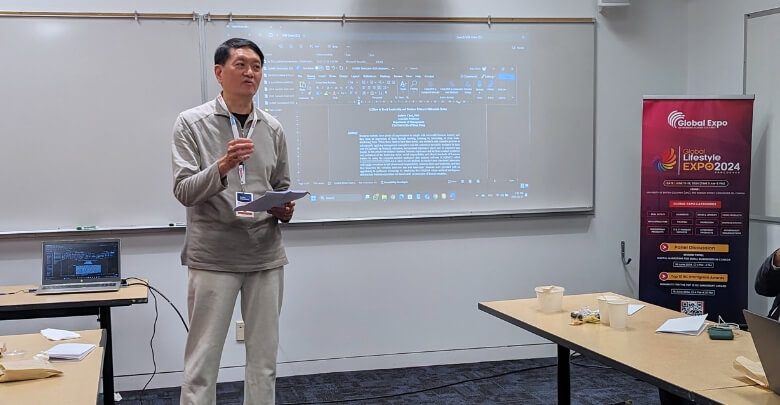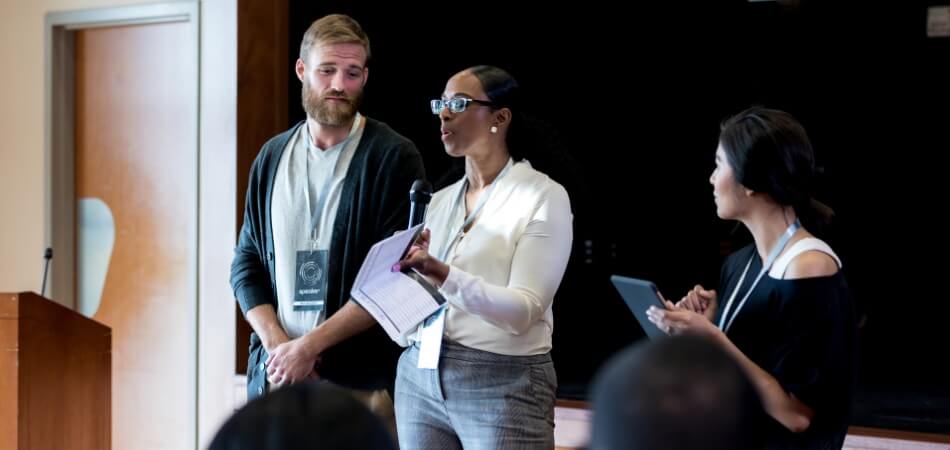Engaging with a guest speaker is an invaluable opportunity to gain insights and knowledge from an expert in a particular field. However, to make the most out of this occasion, you may ask the right questions: What are good questions to ask a guest speaker?
A good question is well-thought-out, relevant, and stimulates a thoughtful response from the speaker. It can open up new avenues of discussion, provide deeper insights, and create a meaningful dialogue between the speaker and the audience.
As you prepare for the guest speaker’s visit, consider the key takeaways you hope to gain and craft your questions accordingly. This will show that you are engaged and respectful of the speaker’s time and help you extract the maximum value from the session.
Who Are the Guest Speakers?
Guest speakers come from various backgrounds and offer insights across many disciplines. Professionals from the industry often take the role of guest speakers. They share practical knowledge, insider tips, and real-world experience that textbooks can’t offer. These individuals provide a unique chance for attendees to gain firsthand insights into a particular career or industry.
Academicians and researchers can attend educational conferences to gain insight into a different flavor of discussion. Their conversations frequently center on theoretical frameworks, recent findings, and groundbreaking research. These gatherings provide an opportunity for intellectual engagement and inspire thoughtful questions among the audience.
Motivational speakers focus on personal development, often inspiring people to overcome challenges and achieve their goals. These speakers utilize compelling stories and practical advice to inspire and engage. They can significantly impact an audience’s outlook and drive, offering invaluable life lessons in the process.
What to Consider Before Asking Questions?
Before you raise your hand to ask a question during a guest speaker’s presentation, several factors should be considered. Here are some key points to keep in mind to ensure your question is both relevant and meaningful.
Relevance to Topic
The question should be directly related to the guest speaker’s presentation or area of expertise. Irrelevant questions can derail the discussion and frustrate both the speaker and the audience. Stay focused on the subject matter for the most impactful interaction.
Clarity and Conciseness
Clear, succinct questions are more likely to receive meaningful answers. Avoid complex phrasing or multiple questions packed into one. A well-articulated question is easier for the speaker to understand and address.
Timing is Key
Consider the most appropriate time to ask your question. If the speaker has allotted time for questions, wait for that segment. Interrupting the flow of the presentation can be disruptive and disrespectful.
Audience Benefit
Before asking, think about whether the question will be beneficial to others in attendance. A question that adds value to the collective understanding is usually well-received. Aim to ask questions that could clarify points for others as well.
Speaker’s Comfort Level
Be mindful of the guest speaker’s comfort and expertise when crafting your questions. Avoid overly personal or confrontational questions that may put the speaker on the defensive. Stick to questions that allow the speaker to showcase their knowledge and insights.
By taking these factors into account, you’ll be better equipped to ask questions that enrich the discussion, provide valuable insights, and respect the time and expertise of the guest speaker.
What are Good Questions to Ask a Guest Speaker?
Asking the right questions can transform a guest speaker’s visit into a highly engaging and insightful experience. Here’s a breakdown of types of questions you can consider to make the most out of the occasion.
Clarifying Questions
If a point or concept isn’t entirely clear during the presentation, ask a question to clarify it. Clarifying questions can help you and the audience better understand the subject matter. Such queries show the speaker that the audience is engaged and seeking to comprehend the topic fully.
Inquisitive Questions
These questions aim to delve deeper into the subject discussed. By asking inquisitive questions, you invite the speaker at conference to share more insights or elaborate on specific points. Such questions can enrich the discussion and elevate the intellectual caliber of the event.
Practical Application Questions
Some of the most valuable insights come from understanding how theory translates into practice. Questions about practical application help attendees envision how to apply the knowledge gained. They serve to bridge the gap between theoretical understanding and real-world application.
Opinion-based Questions
Asking for the speaker’s opinion can lead to a more lively and engaging conversation. These questions allow the speaker to share personal viewpoints and experiences that might not be part of the prepared speech. However, ensure that the topic is one where an opinion is pertinent and meaningful.
Future-Oriented Questions
Questions that ask the speaker to forecast trends or changes in the field can be particularly enlightening. These not only offer insights into what might lie ahead but also help the audience prepare for future challenges or opportunities. Such questions demonstrate a forward-thinking approach and often lead to thought-provoking discussions.
By categorizing your questions into these types, you’ll contribute to a more enriching dialogue with the guest speaker, gaining valuable insights and enhancing the experience for everyone involved.
Why Ask Questions of a Guest Speaker?
Asking questions of a guest speaker is more than just a formality; it’s a crucial part of active engagement and learning. Here are some compelling reasons why posing questions is beneficial:
- Expand Knowledge: Questions open the door for further insights beyond the scope of the initial presentation. They can reveal additional information that enriches your understanding of the topic.
- Clarify Doubts: If a certain point isn’t clear, asking for clarification ensures you don’t leave the session with misconceptions. It helps eliminate any confusion that may have arisen during the talk.
- Engage the Speaker: Questions can stimulate a more dynamic and interactive dialogue. They give the speaker a sense of the audience’s interests and questions, helping effectively tailor the discussion.
- Aid Peer Learning: Questions you ask may also clarify points for others in the audience. They can serve as a catalyst for group discussions and collective learning, enhancing the value of the event.
- Networking Opportunity: Asking insightful questions can make you memorable to both the speaker and your peers. It may serve as a natural gateway for more in-depth conversations or networking opportunities post-event.
Each question asked serves multiple purposes, making the overall experience more rewarding for both the speaker and the audience.
Tips for Asking Someone to Be a Guest Speaker
Communication and thoughtful preparation are important elements of inviting a guest speaker. Below are some tips to consider when extending such an invitation to ensure a positive response and a successful event.
Be Clear on the Event’s Objectives
Know the goals and objectives of your event before reaching out to potential speakers. This will help you align your request with what the speaker can offer. Your clarity makes it easier for them to understand the role they’ll play and the topics they might cover.
Personalize the Invitation
A generic request is less likely to capture the interest of a potential guest speaker. Tailor your invitation to reflect how their specific expertise fits into the theme of your event. This personalized approach shows that you’ve done your homework and value their contribution.
Consider Timing
Timing is crucial when asking someone to be a guest speaker. Try to send the invitation well in advance, allowing them time to consider the proposal and fit it into their schedule. Last-minute requests can be seen as unprofessional and are more likely to be declined.
Outline the Benefits
Detail the mutual benefits of their participation as a guest speaker at your event. This could include exposure to a new audience, networking opportunities, or even a small honorarium. Highlighting the benefits can make the offer more compelling.
Follow-Up Professionally
Once the invitation is sent, wait a reasonable amount of time before following up. Keep the follow-up communication respectful and concise, reiterating your enthusiasm for their potential participation. A courteous follow-up can help seal the deal or clarify any unanswered questions.
By implementing these tips, you enhance the likelihood of securing a well-suited guest speaker for your event, and you set the stage for a successful and enriching experience for all participants.
Final Considerations
Asking questions during a guest speaker’s presentation is not just a formality; it’s an essential aspect of making the most of the learning opportunity. The challenge often lies in knowing what are good questions to ask a guest speaker.
The right questions can facilitate deeper insights, interactive dialogue, and an enriched learning environment. They should be relevant to the topic, transparent, and beneficial to both the speaker and the audience. Consider the timing and the speaker’s comfort level when asking your questions.
Well-crafted questions can transform a guest speaker’s session from a monologue into a meaningful, two-way conversation that brings value to everyone involved.








